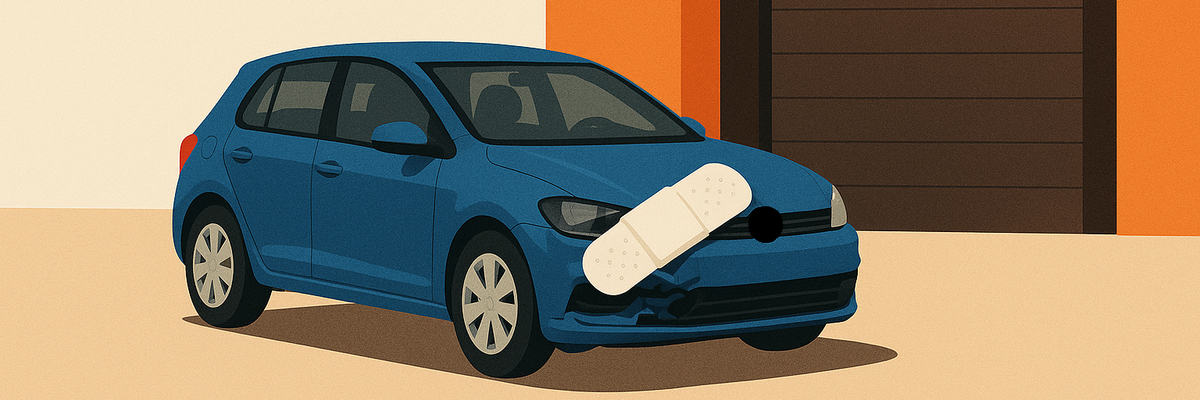$75K in Car Insurance? Here's Why It's Probably Not Enough

Almost every state requires drivers to have auto insurance that covers both injuries and property damage that they cause in an accident. But the state minimum is usually far too low. Many states only require about $75,000 in total coverage.
That may sound like a lot, but imagine you get into an accident where cars are totaled and multiple people are injured. You could be responsible for hundreds of thousands of dollars in medical bills and property damage -- even if you live in a no-fault state.
I'll show you why the minimum is not enough, as well as what sort of coverage can protect you from a financial disaster.
State minimum car insurance: A quick overview
Every state requires two types of coverage:
- Personal injury liability. This covers injuries you cause to other people in an accident. There's a per-person limit and a per-accident limit on your coverage.
- Property damage liability. This covers damage you cause to someone else's property (namely, their vehicle).
The minimum dollar amount of coverage varies from state to state.
Most no-fault states also require personal injury protection (PIP). When a driver is injured in an accident, their own PIP is tapped first to pay for medical bills, lost wages, and other injury-related expenses. Once PIP is used up, any remaining costs are paid for by the at-fault driver's liability insurance -- and then, potentially, by the at-fault driver.
Why the minimum is not enough
Let's say you live in a no-fault state, and your auto insurance includes:
- $10,000 in personal injury protection
- $25,000 per person in bodily injury liability insurance
- $25,000 in property damage liability insurance
Now let's say you get into a major accident with a vehicle containing two people. Both cars are totaled, and everyone is taken to the hospital for serious injuries. You're found to be at fault.
For starters, your insurer won't pay to replace your vehicle. And if you use up your personal injury protection, you'll have to pay out of pocket for additional medical costs that aren't covered by your health insurance.
The medical costs of the other car's passengers could easily exceed $100,000 (and in some cases could climb above $1 million). And the average cost of a new car today is nearly $50,000.
Depending on the auto and health insurance of the other people involved, your insurance could fall short by $50,000, $100,000, or even more. And you could be sued for the remaining costs, as well as for emotional distress.
What coverage should you have instead?
Here's a good starting point for auto insurance that actually protects you.
Bodily injury liability: $100,000 per person, $300,000 per accident
- This offers much more protection in case multiple people are seriously injured.
Property damage liability: $100,000
- That's usually enough to cover damage to multiple cars, as well as buildings, fences, and more.
Uninsured/underinsured motorist coverage: $100,000 per person, $300,000 per accident
- This coverage pays you if another driver causes an accident and doesn't have enough insurance.
- Important because many drivers carry minimum insurance -- or none at all.
- Some states require this coverage, but the minimums are too low to offer much protection.
Collision and comprehensive coverage
- This covers damage to your car, whether from an accident, theft, fire, or weather.
- Especially important if you drive a new or valuable vehicle.
And if you don't have health insurance, look into personal injury protection. Note: In some states PIP is required, in some it's optional, and in some it's not available at all.
How much more does good car insurance cost?
This depends on a lot of factors, like where you live, your driving history, your credit score, your vehicle, and more. "Full" coverage may cost you several hundred dollars more per year than minimum coverage -- or it may not.
Either way, the best car insurance policy could end up saving you way more than you pay. You'll also sleep better at night -- and feel more relaxed behind the wheel -- if you know that a single accident won't wreck your car and your finances.
The good news is that the top auto insurance companies offer great coverage and low premiums. Click here to compare quotes from top carriers and find the coverage you need at a rate you can afford.
Our Research Expert
We're firm believers in the Golden Rule, which is why editorial opinions are ours alone and have not been previously reviewed, approved, or endorsed by included advertisers. Motley Fool Money does not cover all offers on the market. Motley Fool Money is 100% owned and operated by The Motley Fool. Our knowledgeable team of personal finance editors and analysts are employed by The Motley Fool and held to the same set of publishing standards and editorial integrity while maintaining professional separation from the analysts and editors on other Motley Fool brands. Terms may apply to offers listed on this page.